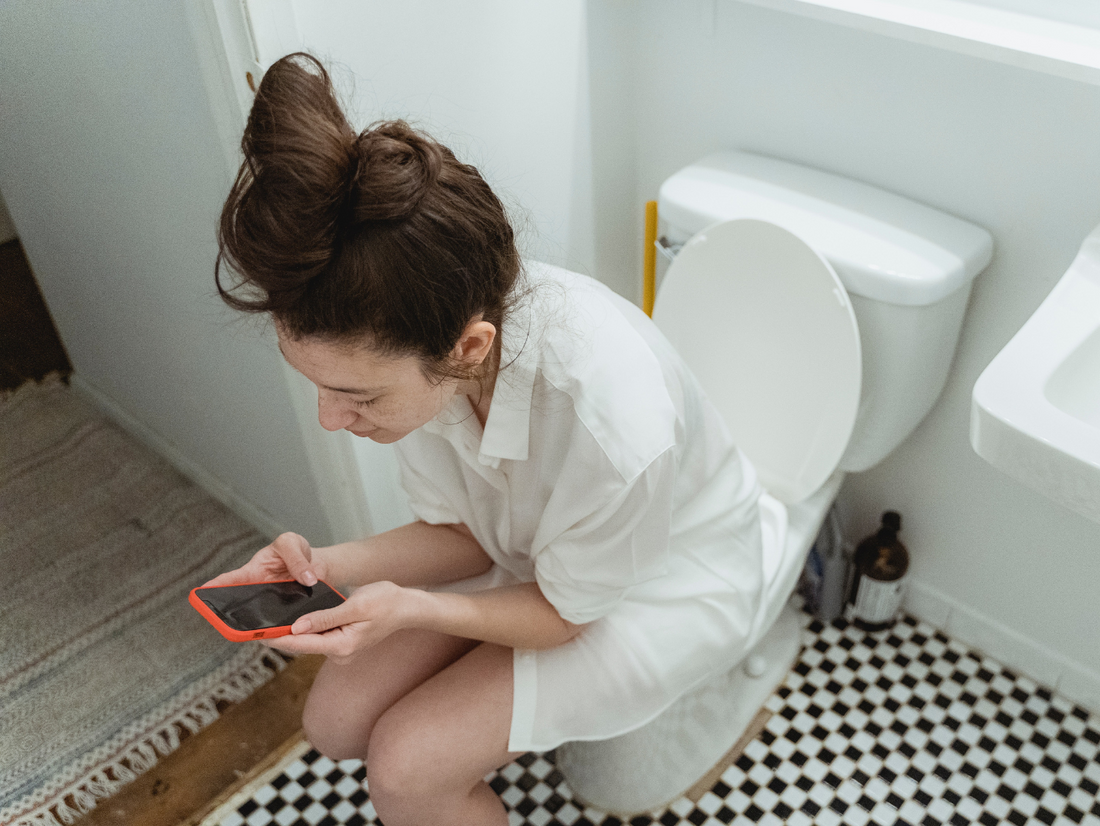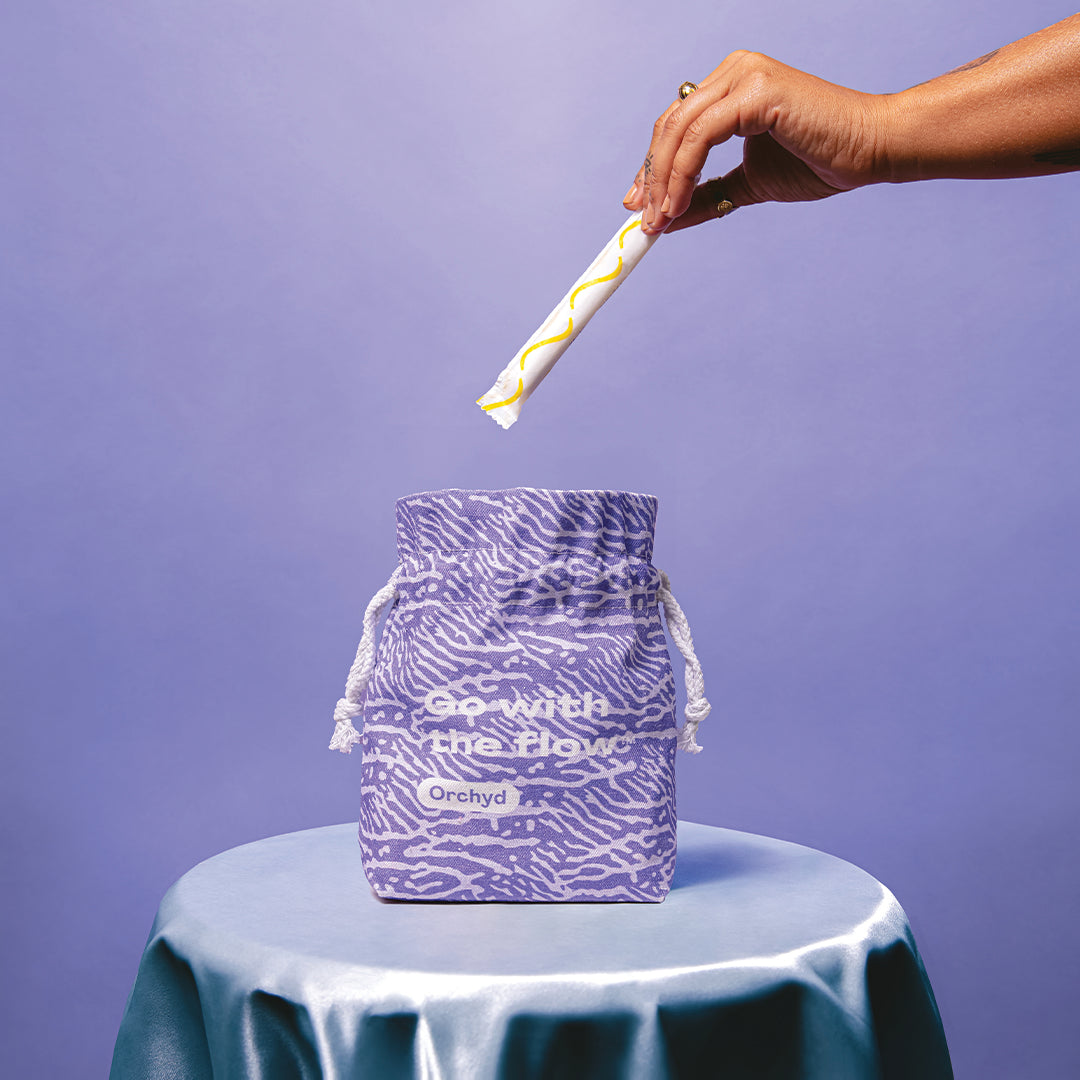
What Causes Period Poops?
Share
Period poops, also known as menstrual bowel movements, are influenced by several factors related to hormonal changes and the physiological effects of menstruation. The menstrual cycle involves fluctuations in the levels of estrogen and progesterone, which can impact various bodily functions, including the digestive system. These hormonal changes can increase bowel activity, resulting in looser stools or more frequent bowel movements.
Why You Poop More on Your Period
There are several reasons why some menstruators may experience more frequent bowel movements during their period. One reason is the release of prostaglandins, hormone-like substances that play a role in inflammation and pain. Prostaglandins are released during menstruation and can cause the muscles of the intestines to contract more strongly, leading to increased bowel activity and more frequent trips to the bathroom.
Another factor is the close proximity of the uterus and the intestines. During menstruation, the uterus contracts to shed its lining. These contractions can stimulate the nearby intestines, leading to bowel movement urgency and more frequent pooping.
Additionally, some people may experience increased sensitivity in the gastrointestinal tract during their period. This heightened sensitivity can result in abdominal discomfort, cramps, and an increased urge to have a bowel movement.
Why You May Poop Less on Your Period
While some menstruators may experience more frequent bowel movements, others may feel like they can't poop during their period. This can be attributed to a variety of factors. One common reason is the effect of hormonal changes on the gastrointestinal tract. The rise and fall of estrogen and progesterone levels can affect bowel movements differently for each person. Some individuals may experience slower bowel movements or constipation during this time, leading to a sensation of difficulty in passing stools.
Moreover, the release of prostaglandins during menstruation can cause the muscles of the intestines to contract more strongly. In some cases, this can lead to cramping and discomfort, making it challenging to relax the muscles required for a bowel movement.
Additionally, psychological factors such as stress, anxiety, or discomfort related to menstruation can contribute to the feeling of being unable to poop during the period.
Typical Characteristics of Period Poop
Period poop can vary from person to person, but there are some common characteristics that many menstruators may experience. These include:
Changes in Consistency
Stools may be looser or more watery than usual due to increased bowel activity and hormonal fluctuations.
Increased Frequency
Some menstruators may have more frequent bowel movements during their period compared to their regular bowel habits.
Abdominal Discomfort
Cramps, bloating, and abdominal pain are common symptoms during menstruation and may be associated with period poops.
Urgency
The need to have a bowel movement may feel more urgent and intense than usual.
Excessive Gas
Hormonal changes and increased bowel activity can lead to the production of more gas, resulting in bloating and flatulence.
Why Do Period Poops Hurt?
Period poops can sometimes be accompanied by discomfort or pain. There are several factors that contribute to this.
Inflammation
Menstruation involves the release of chemicals called cytokines, which are involved in the inflammatory response. These cytokines can affect the gastrointestinal system, leading to increased sensitivity and pain during bowel movements.
Bloating & Gas
Hormonal changes during the menstrual cycle can cause water retention and bloating. This can put pressure on the intestines and contribute to discomfort or pain during period poops. Excessive gas production can also exacerbate the discomfort.
Pre-existing Conditions
Some menstruators may have pre-existing conditions, such as irritable bowel syndrome (IBS) or endometriosis, which can cause gastrointestinal symptoms during menstruation. These conditions can further contribute to the pain or discomfort experienced during period poops.
When to See a Doctor About Your Period Poops
If you are experiencing severe or persistent symptoms related to period poops, it may be a good idea to consult your doctor or chat with a doctor through Orchyd MD™. If you are experiencing any of the following, please contact a doctor.
-
Intense pain: If you have severe abdominal pain or cramping that significantly interferes with your daily activities.
-
Persistent symptoms: If your period poops are consistently accompanied by severe diarrhea or constipation or persist beyond your menstrual phase.
-
Excessive bleeding: If you notice any signs of excessive bleeding or unusual changes in your menstrual flow.
-
Other concerning symptoms: If you experience weight loss, rectal bleeding, severe bloating, or changes in bowel habits unrelated to your menstrual cycle.
How To Stop Period Poops
While it may not be possible to stop period poops completely, there are several strategies that can help alleviate the discomfort and manage the symptoms. Here are top tips!
Track Your Symptoms
In the Orchyd app, you can track your menstrual cycle and all the symptoms you experience, including period poops! Tracking your bowel movements can help identify any patterns or triggers and allow you to understand your body and manage your symptoms more effectively. In the Orchyd app, you can track: Nausea, Diarrhea, Cramps, Appetite changes, Bloating, Constipation, and Gassy. You can also customize your own symptoms if you want to learn more about your bowel movements and your cycle.
Stay Hydrated
Drinking plenty of water can help soften the stools and prevent dehydration, which can contribute to constipation. Aim to drink at least 8–10 glasses of water per day. In the Orchyd app, you can track water intake by setting a goal and creating reminders so you never go a day dehydrated.
Eat a Balanced Diet
Consuming a fiber-rich diet can help regulate bowel movements and prevent both constipation and diarrhea. Include whole grains, fruits, vegetables, and legumes in your meals to increase fiber intake. However, be cautious with sudden dietary changes, as they may worsen symptoms for some individuals. Gradual adjustments may be more beneficial.
Manage Stress
Stress can worsen digestive symptoms, including period poops. Engage in relaxation techniques such as deep breathing exercises, meditation, or yoga to reduce stress levels. Regular exercise can also help alleviate stress and promote healthy bowel movements. In the Orchyd app, you can track a huge range of moods, including Anxious, Irritated, Mood swings, Obsessive thoughts, Self-critical, and Stressed. The more you track, the more you understand how symptoms overlap and affect your overall well-being.
Over-the-Counter Remedies
Over-the-counter medications such as anti-diarrheal medications or fiber supplements may provide temporary relief from period poops. However, it is important to consult a healthcare professional before using any medication to ensure it is suitable for your specific situation. You can easily chat with a doctor in the Orchyd app through Orchyd MD™, our telehealth feature that connects you to a real-life doctor anytime you need it. Visits cost less than the average co-pay, and doctors are available 24/7.
Heat Therapy
Applying a heating pad or taking a warm bath can help relax the muscles and alleviate the cramping associated with period poops.
Probiotics & Supplements
Probiotics are beneficial bacteria that can promote a healthy gut. Consuming probiotic-rich foods or taking probiotic supplements may help regulate bowel movements and improve digestive health. The Orchyd Marketplace™ has a plethora of solutions to your digestive woes. Check out Daily Digestion from WTHN, Happy Hormones from Xula, and the Detox Digestive Enzymes from Juna. New products are constantly being added to the Marketplace, so subscribe to the newsletter to stay in the know.
And again, consult a healthcare professional or chat with a doctor through Orchyd MD™ for personalized advice.
There you go! Now you know too much about period poops, but you are stronger for it. So go forth and period poop fearlessly.



